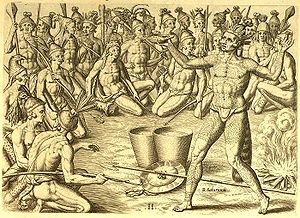Saturiwa (chief)

Saturiwa (also spelled Saturioua, Satourioua and Saturiba) (Timucua:
History
Chief Saturiwa led the
According to the French, Saturiwa was sovereign over thirty other villages and their chiefs, ten of whom were said to be his 'brothers'.
French sources also record the name of his son, Athore. Athore was also a chief of a village under his father Saturiwa. The Huguenots described Athore as handsome, prudent, and honorable. The Saturiwa chiefs practiced incestuous marriages to keep power within the family. Therefore, Saturiwa betrothed his eldest wife to their own son Athore, with whom she had many children. Though the Huguenots respected Athore, they were disgusted by his incestuous marriage to his own mother.[2]
The powerful Saturiwa quickly forged an alliance with the French, hoping to secure their aid against his enemies, the Utina up river. However, Laudonnière reneged on his deal to help Saturiwa against the Utina, as he also wanted to pursue an alliance with them. Relations between the Saturiwa and the French soured for a time, but soon cordial relations were restored.[3]
When the
Saturiwa and his family are depicted in several of
References
- ISBN 0-8130-0535-3
- ISBN 978-1-56164-774-3.
- ^ ISBN 0-8130-1424-7.
